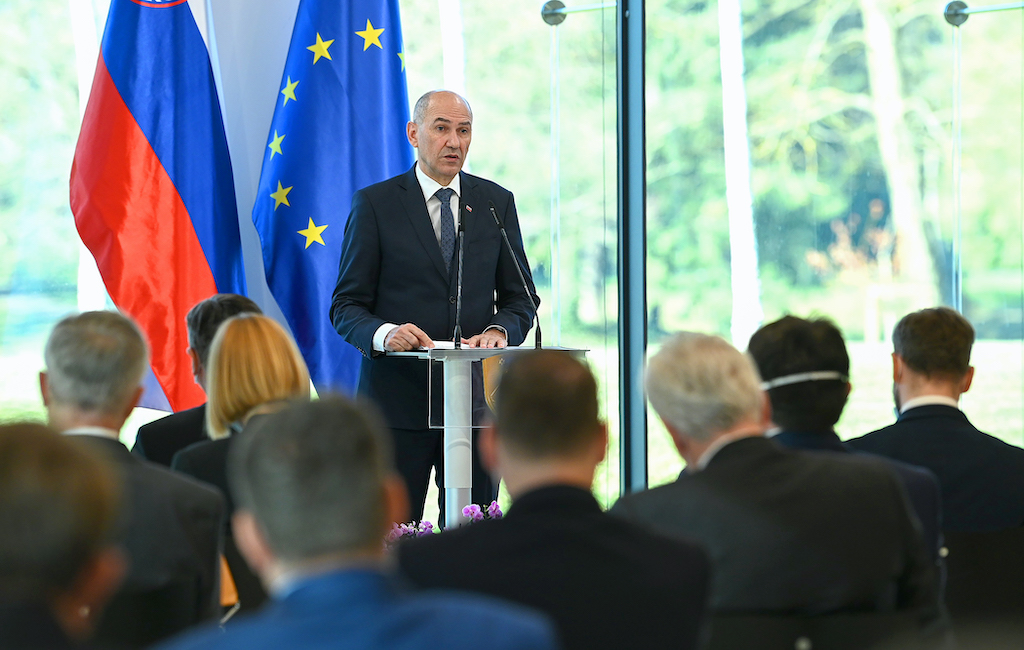By: C.R.
On Friday, Prime Minister Janez Janša attended an informal meeting of the European Council in Brussels, where he and European leaders discussed the current situation in Ukraine and relations with Russia, as well as the aggravated security situation due to the accumulation of Russian forces in and around Ukraine.
After the meeting, he said in a statement for the media that today’s session was mainly about exchanging information, especially those who have been more active in reconciliation diplomacy in recent weeks. “For some, this was not much new because they have been exchanging information on an ongoing basis. The general opinion is that the situation is being monitored and reacted to based on the principles on which we operate in the EU and based on all the commitments made by individual parties so far,” said the Prime Minister.
Regarding the imposition of sanctions, the Prime Minister said that the European Commission had informed European leaders today that it was preparing to impose sanctions, that this was also a matter of wider consultations with other factors outside the EU, not just the US, but that it all depended on developments. “Slovenia fully supports the EU’s efforts to de-escalate. I regret that Mr Putin has often taken a step forward in these replays and that perhaps it has only come to great unity in the West in recent weeks, which will be much more difficult in the future,” said the Prime Minister, adding that even Vladimir Putin does not benefit from any aggravation.
“The situation is different every day, but at the same time, paradoxically, it has been the same for several years. In conversations with representatives of the Ukrainian authorities, I was told that nothing dramatic has happened recently and that what is happening now and under the spotlight of the world public, they have been facing since the occupation of Crimea and that the fact that Russia withdraws its forces a few kilometres to the left or right does not mean anything, because this can change overnight,” said the Prime Minister, adding that the long-term depletion of Ukraine is at stake here. “In my opinion, this is also Kremlin’s goal. Ukraine began its independent journey with a population of over 50 million, today they are at 38 million. Ukraine’s development prospects are deteriorating drastically. Tensions in recent weeks have resulted in a major capital flight from Ukraine. Ukraine needs investment and new jobs, but unfortunately capital has gone in the opposite direction. Behind all this, which is happening with pressure from Kremlin, is the weakening of Ukraine and, finally, the erasure of Ukraine as a sovereign, independent state,” the Prime Minister described. According to him, it is in the EU’s strategic interest for Ukraine to remain a sovereign and independent state. “Battle for Europe is being fought on Ukraine’s fate,” he said.
In connection with the sanctions, the Prime Minister added that sanctions in the field of technology have been mentioned so far, in areas that are in some way of strategic importance when it comes to dual use, i.e., the military use of a particular technology. “The vast majority of Slovenian trade with the Russian Federation is not from this field. However, if there is a further escalation, we will all suffer a loss and we will all be losers,” said the Prime Minister, adding that for this reason Slovenia is “strongly on the side of those who are working to reduce tensions and seek peaceful solutions to open issues.”
“Security is an important issue, and we talk about security all the time, but what we really need is more action. We have seen a lot of action and effort in recent weeks, and it seems to me that this is the first time that the true strength of the European Union has come to the surface. All 27 member states are not completely united in resolving this issue, but we are united more than ever in recent history,” the Prime Minister added.
Asked whether he would tell Russian President Vladimir Putin not to face the European Union, because it will cost him a lot, Prime Minister Janez Janša said that he would not choose such harsh words but would point out that “further escalation of conflicts and tensions does not bring winners, but only losers.”

